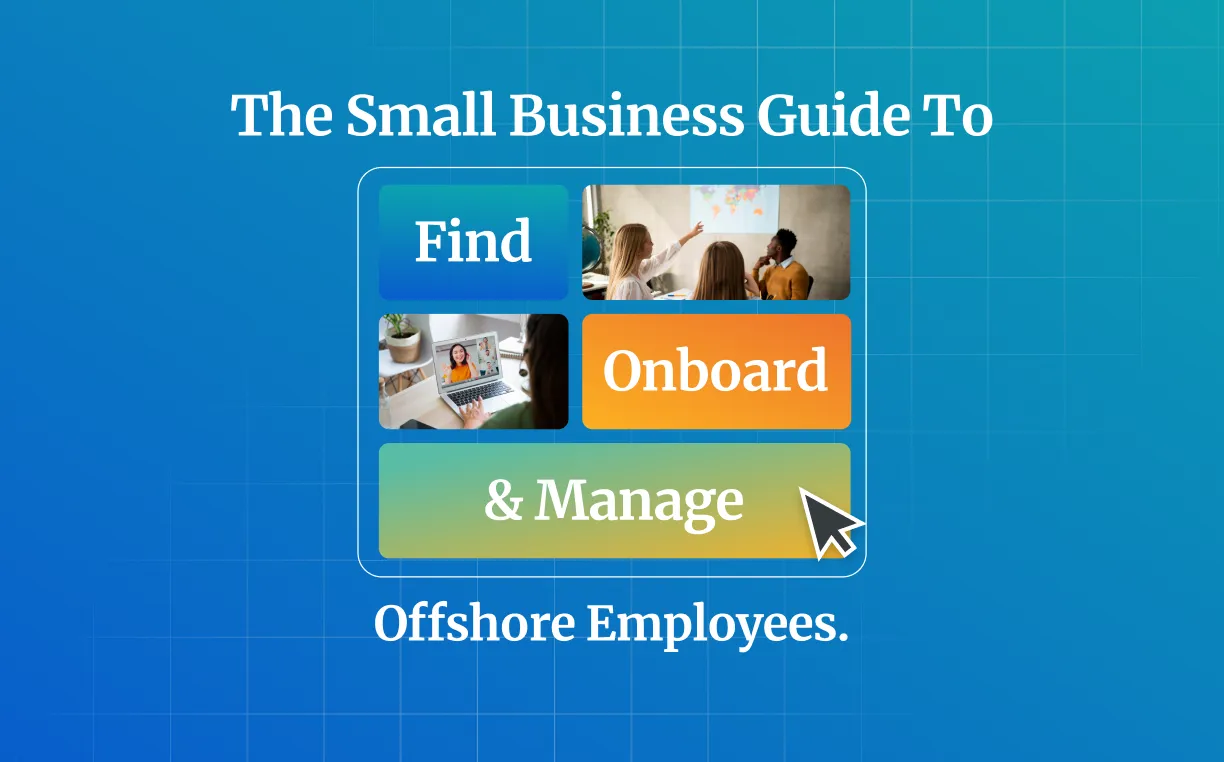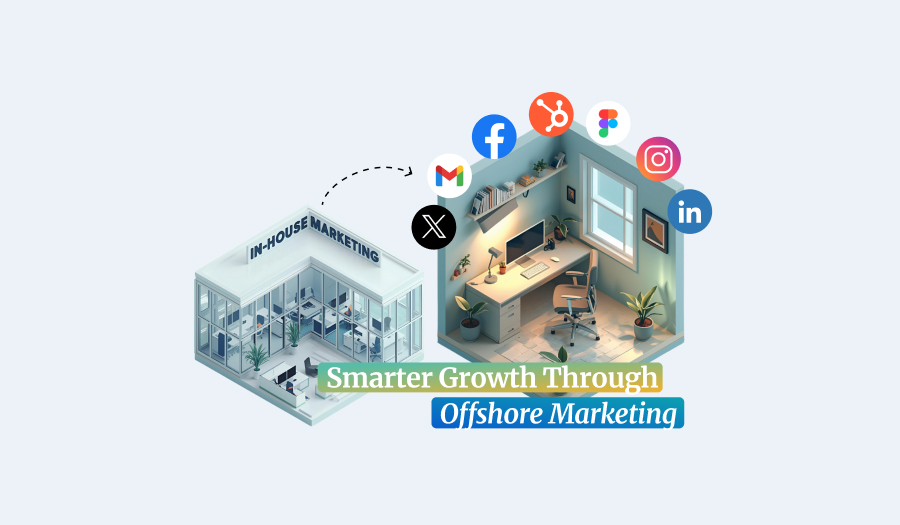The Challenges of Finding Offshore Employees

Key Takeaways:
- Finding offshore talent is harder than local hiring due to distance, cultural differences, and unfamiliar hiring platforms.
- Referrals are less accessible offshore, but networks and staffing agencies can replicate the same benefits.
- Navigating job boards and recruitment platforms abroad requires research, time, and local expertise.
- Resume evaluation and qualification standards differ by country, making cultural fluency and structured review systems critical.
- Interviews are virtual and biased risks increase, requiring scorecards, matrices, and standardized evaluation to fairly assess candidates.
- Offshore staffing agencies simplify the process, providing vetted candidates, translation support, and cross-cultural hiring expertise, while still delivering significant cost savings.
Using offshore labor has countless benefits. Businesses can cut their labor expenses, boost productivity, and forge a brighter and more innovative future. With all the benefits, there do come challenges. Simply getting off the ground and finding the workers a business needs is the first and possibly the greatest hurdle. Finding quality employees is a challenge, even when hiring American workers, but finding the best candidates is an even greater challenge when they are an ocean away.
Even when hiring local workers, businesses have to contend with the challenges of referrals, managing interviews, understanding qualifications, and reviewing resumes, but these challenges are only magnified when offshoring labor. The good news is that there are solutions that any business can rely on.
Working Without Referrals
Roughly 50% of jobs in the US are filled through employee referrals, making them, in many ways, the lifeblood of the beast that is hiring, and there are countless good reasons for it.
On the whole, referrals are generally cheaper than other hiring methods. Working with referred candidates means a business doesn’t have to devote time or resources to posting on job forums, going through mountains of resumes, or verifying a candidate’s qualifications.
Referred candidates also come with the benefit of an implied seal of approval. If a trusted employee is willing to vouch for a potential hire, then they’re probably willing to stake their reputation on them. This seal of approval can work to further streamline the hiring process. A business may not have to conduct as many interviews with a referred employee, and qualifications are usually deemed more reliable.
Every business wants more referrals, and many have specific programs in place to bring them in, but how do you get referrals when offshoring labor?
Solutions
When it comes to hiring offshore employees and offshoring labor in general, businesses need to do as they always do: leverage all of the resources that they have at their disposal.
If a business has an employee that already has a relationship with the country that they’re attempting to hire from, then that employee can immediately act as a source of information and referrals. They might know of people who are looking for work, or who may fit the profile. If they don’t know someone, maybe they know someone who does.
When it comes to finding offshore employees, businesses need to see referrals as a series of links on a chain. If you don’t know someone who meets your criteria, maybe you know someone who does, or maybe they know someone who knows someone who does.
While a business can definitely go it alone, a viable option is to work with a reputable offshore employment agency. Employment agencies that specialize in offshoring labor have a significant number of preexisting employees whom they can easily tap for referrals for whatever position a business may need filled, and they frequently have a system in place that incentivizes referrals, just as many American businesses do.
Managing Different Hiring Methods
Without referrals, when a business is looking for offshore employees, they usually need to find them the hard way.
One of the most common hiring methods today is to post on job boards. Sites like LinkedIn, Indeed, and Handshake are simple and reliable and any business can quickly post on one – when hiring domestic workers. Hiring workers in another country often requires quite a few extra steps.
Potential hires in other countries frequently use different job and recruitment platforms that are not common in the US. Countless other websites devoted to hiring exist, and many alternative ones are far more popular in other countries than the traditional sites. When offshoring labor, figuring out which site is the best might require a lot of time and a lot of money, things which few businesses have in abundance.
The challenges don’t end with simply finding the best websites. Soliciting candidates in other countries might require different tactics. Cross-cultural communication is never easy, especially when it comes to hiring. A job title in the US might mean something very different in another country. Everything from salaries and benefits to hours and vacation times can also be entirely different, and navigating these challenges can be an uphill battle.
Businesses may also take the route of sourcing their own candidates, but this also comes with its own challenges. Directly hunting down possible employees comes with the benefit of finding the candidates with the qualifications that a business wants, but those qualifications themselves might be different in other countries.
A business can go onto a job board looking for an offshore candidate, but it’s tough to figure out what you want when credentials are so different and the pool is so massive. Businesses are traditionally limited to local candidates, but when offshoring labor, the world is wide open, and it doesn’t matter how much you tighten the criteria the requirements for a position, the pool isn’t going to get much smaller.
Solutions
Businesses can buckle down and devote the time and money necessary to figuring out offshore job boards and directly hunting down employees overseas. The benefits almost always outweigh the challenges. Offshore employees offer an incredible value, and finding a qualified employee anywhere in the world is always worth the trouble.
Staffing agencies that specialize in offshoring labor offer another solution. Good staffing agencies know the best sites to find the best hires, and can understand and overcome the cross-cultural communication challenges when creating the ideal job posting. Staffing agencies know who the ideal candidates are for any position, and know how to directly solicit them if necessary.
Reviewing Resumes
The challenges of hiring offshore employees don’t end with just posting a position on a job board.
In many countries, any job in the employ of an American business is going to be an incredibly lucrative position. American jobs imply greater stability, better wages, and better benefits than what comes with domestic jobs. Local economic conditions might also create a surplus of workers, simply meaning that there are already going to be multiple people vying for any position, both domestic and offshore. It’s partly why labor offshoring is so lucrative, but it does create challenges.
A job posting for an American company wanting to hire American employees might get a hundred or so applications. But conditions offshore could mean that if that same business were to post the same job in a different country, not hundreds, but thousands of applications could come in. Sorting through all that information could be an absolute nightmare for any business.
Understanding resumes in other countries requires its own level of fluency. In other countries, it’s entirely acceptable for job seekers to include pictures of themselves in their resumes, or include emojis, both of which can be seen as inappropriate or a waste of space in the US. Possible hires in other countries may also use different phrases, forms of grammar, or idioms. All of these can be a challenge for any business to overcome.
Solutions
AI can offer a business a rapid way to go through multiple resumes at once, but AI is quite simplistic and doesn’t offer nuance. AI frequently sifts through keywords and numbers, but rarely looks at a resume through an aggregate lens. Additionally, an AI that is tuned to go through resumes in the US may miss valuable information, or lack the nuance to grasp cultural differences in resumes. AI also has the potential to be abused, and an employee can craft a resume that can appear great to an AI but is anything but acceptable to a human reader.
Businesses can also come up with systems to manually go over resumes. Employees can be directed to parse out certain bits of information and quickly scan for quality, but all of this requires time and money and a level of cultural fluency that many employees lack. Businesses could wind up wasting man-hours on something less than productive.
A good solution for any business that’s interested in labor offshoring is to go with an offshore staffing agency. Businesses that specialize in hiring offshore employees have systems in place to go through resumes using both humans and technology. They and their employees are more than capable of navigating cultural barriers, and have a systematized method for finding the ideal candidates.
Understanding Qualifications
Gauging a candidate’s qualifications can be difficult, even in the US. When it comes to labor offshoring, things get even tougher. What makes a qualified candidate in another country can look very different from one in the US.
Education standards in other countries can be a challenge to gauge. Most American businesses know which universities are considered the highest quality in the United States, but that knowledge rarely translates when it comes to labor offshoring. Few businesses or individuals are aware of the best universities in the Philippines, or South Africa, or India. Trying to figure out which universities are the best to hire from can be daunting.
Education standards in different countries may also be different. What someone in the US would be trained to do as part of their degree might be completely different from what someone in another country would be trained to do as part of the same degree. Even in the US, simply expecting someone to know how to do something because of their degree can be a major problem, but that problem can be magnified when trying to work with offshore employees.
Solutions
Options do exist for a more rigorous approach to gauging the qualifications of an offshore candidate. Standardized tests are becoming more and more common in the workplace, and businesses can create their own to determine a candidate’s quality. Many standardized tests are also available online, and a number of businesses today specialize in producing standardized tests for various jobs throughout the business world.
While businesses can create or access standardized tests, implementing them with offshore candidates can be a significant challenge. Ensuring test security is difficult, and making sure that any questions and answers are clear enough to cut through any cultural barriers can be a challenge.
A quality offshore staffing agency can help manage many of the challenges. Labor offshoring businesses know how to gauge a candidate’s qualifications better than a business going out on its own could. They are aware of the best universities in countries all over the world, and they know what goes into their degree programs. Offshore staffing agencies can also rigorously test potential candidates using the best methods available to ensure that any hire is the best one for the job.
Interviews
Posting on offshore job boards and sifting through thousands of resumes are just the first steps in finding the right offshore employees. The interview process adds a whole new layer of complexity.
With thousands of resumes comes thousands of potential interviews. Even when a business has figured out all possible candidates’ qualifications and whittled away at all the options, dozens and dozens of candidates could be left, and interviewing them all is rarely an option.
When labor offshoring, interviews are almost always exclusively online. The ability to “size up” a candidate in person is no longer an option when it comes to offshore labor. There is no “office environment,” and there are no handshakes. Whatever a business learns about a candidate will come from virtual interactions, and virtual interactions alone.
Language barriers can also create significant challenges. Roles that don’t require a high level of fluency could mean that while an employee is entirely qualified for the position itself, they may struggle with the interview due to a lack of complete English fluency. Even with an AI or a living person to translate, gauging the quality of an employee without solid English skills can be a major challenge.
Interviews also come with a significant amount of bias. How an employee is dressed, how they look, how they carry themselves, the language they use and more can all introduce significant bias into any interview process. These issues are only amplified when labor offshoring, where differences in dress, language, mannerisms, and style can introduce far more biases into the interview process.
Regardless of how qualified a candidate may be, how perfect they may be for the role, just a difference in appearance or mannerisms, one that wouldn’t matter thousands of miles away, can cost them a job – and a business a great employee.
Solutions
Businesses can overcome many of the inherent biases of interviewing an overseas candidate by creating scorecards and matrices where they identify characteristics that are the most important to the role. By quantifying what they want, they can potentially eliminate unnecessary judgement and find the best candidate, regardless of the differences.
Businesses can also interview a large number of candidates very quickly through rapid text interviews or quick video interviews. Recruiters can size up candidates with the help of AI, and use further scorecards and matrices to determine the quality of a candidate.
Offshore staffing agencies offer even more solutions. A quality staffing agency knows the ins and outs of labor offshoring better than any business. They can go through a significant number of candidates very quickly, and conduct a number of screening interviews using a rigorous set of criteria to create a short list of the ideal candidates based on a business’s needs before the hiring business even gets involved in the interviews.
Offshore staffing agencies can help schedule interviews, provide translation services, and help overcome cultural differences. Offshore staffing agencies can also prevent businesses from introducing biases into the interview process to ensure that they don’t overlook the ideal candidates for the job.
Conclusions
Overcoming the challenges of hiring offshore employees can seem daunting, but there are many ways around them if a business is willing to put in the effort, but the rewards make it more than worthwhile.
Labor offshoring can also help a business drastically reduce its labor expenses. Depending on the position, a business can save roughly 80% on labor costs. Businesses can find the most qualified employees capable of meeting any of their needs by going offshore. Virtual assistants, accountants, marketing, graphic designers, and even management can be found offshore for significantly less.
While businesses can do it independently and still gain the benefits of offshore labor, they can also reach out to offshore staffing agencies. An offshore staffing agency can help a business reduce the burden of finding offshore employees, while still reaping the same rewards.
Make the switch to offshore labor today.





